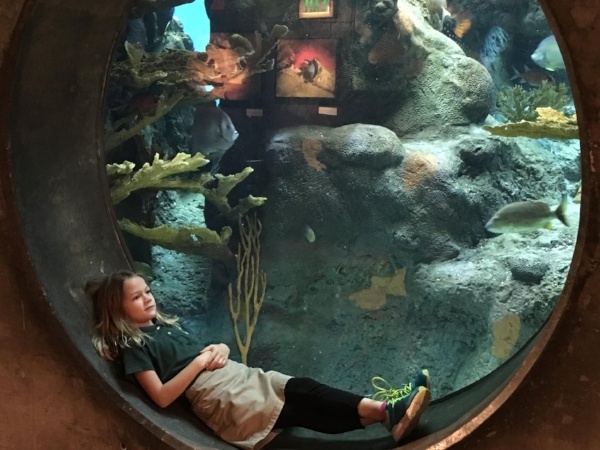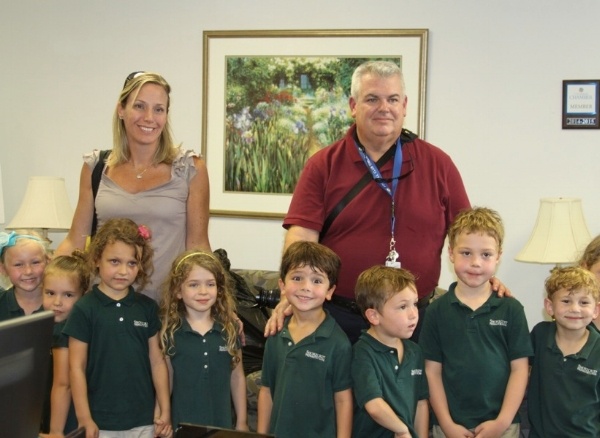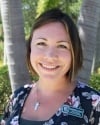Close your eyes with me for a moment and think back to your elementary school days. Feel the bubbling excitement that welled up as you arrived at school, brown paper lunch sack in hand, school bus idling in the parking lot. Today, you are leaving your pencils in your desk. It’s field trip day.
I remember field trips as a break from reality, a chance to get away from the well-loved but also well-worn routines of the school day. Growing up in Westhampton Beach, New York -- a small town that filled in the summer with “city people” and emptied in the winter except for a handful of locals -- our field trips generally followed the “city people” back to their home in Manhattan. We would go to the Museum of Natural History to marvel at the dinosaur skeletons, or to Midtown to see the Rockettes at Radio City Music Hall. Oh, how I loved the excitement of the big city. What my teachers didn’t realize, I think, is that the message I received was that there was nothing interesting to learn in my hometown - rather, anything worth discovering happened far away, in big cities.
We want something different for our students.
 Relaxing during a first grade trip to the Florida Aquarium.
Relaxing during a first grade trip to the Florida Aquarium.
Field experiences are one of the most powerful experiential learning tools that we have as educators. Going out into the world, experiencing it physically, engages us more deeply than any in-classroom experience can. When we go out into the world, we learn not only on an intellectual level but also an emotional level. Bank Street College of Education professor Salvatore Vascerello writes:
“Each time children go out into the world with their class and are free to experience it from their own perspective, they are offered an opportunity to form their own opinions about what they see and hear and feel... Encountering the complexity of that world and meeting the people who make it function, when carefully planned, can forge new connections that enlarge the child’s community.... Engaging the world out there--whether it be the people living in Grand Central Station, construction workers skillfully operating cranes that seem to go up to the sky, sanitation workers showing what happens to massive amounts of garbage--provokes questions, real questions; the need to find out; the need to share their impressions with others; and in some cases the need to act.” (Vascerello p. 199-200)
What better way to learn about our world than to talk to the people in it? Imagine a group of students becoming real researchers - interviewing and sketching and gathering data - and making firsthand discoveries as social scientists studying their community.
 Mrs. Vigue and Mr. Schiaparelli with their kindergarten students at the Salvation Army.
Mrs. Vigue and Mr. Schiaparelli with their kindergarten students at the Salvation Army.
Each year, our Kindergarten students at Shorecrest travel to the local Salvation Army to learn about how communities care for people without homes. Our fourth graders go to the dump to find out what happens to our trash after we wheel the giant black cans to the street in the early hours of the morning. Think of how intense these experiences can be, maybe even a little uncomfortable. Think of the questions they provoke - “What if the Salvation Army pantry runs out of food?” “What if we run out of space at the dump?” “How can I be part of the solution?”
One of our goals as a faculty is to continually develop field experiences that turn our learners into question-askers and risk-takers and deep thinkers. So when you see a crowd of green shirts out and about, you are seeing more than a group of children on a trip - you are seeing adventurers and researchers at work. Give us a wave, or maybe explore with us for a while. You are sure to find that our curiosity is infectious, and you may even discover something new about your own world.
Dominique Craft is the Lower School Dean of Curriculum and Instruction at Shorecrest. To learn more about project-based learning and field experiences in the preschool, elementary school, middle school, and high school programs at Shorecrest, please join us for a personal tour of the Shorecrest campus.

















